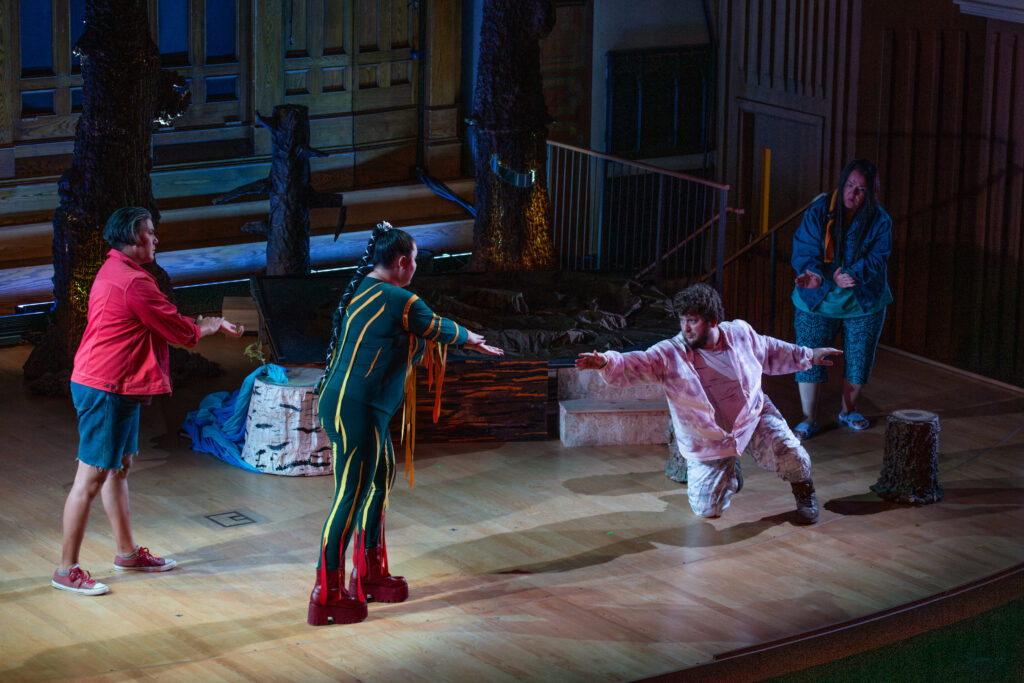Wigwaas cheenan into the water.
Wigwaas cheenan on the water.
A time-forgotten home in the remote North Ontario woods. Two sisters, Gladys and Constance. Remembrance and cruel experience. Echoes of present-day lives half-lived.
The Family Tree, a battered birch, a lone survivor of decades-old industrial Agent Orange airborne spraying. Their mother who planted it dead from cancer. Gladys and her chainsaw. “Not all of us want to remember.” Memories that can never be toppled. Years of cutting herself, her arms mapped with scars. Constance understands more than she claims. “You never speak about it. What’s saved inside beneath your skin.” The residential school. Gladys taken. “There was no one there to save me.” The images of children wrapped in thin worn out blankets flung into the unmarked graves Gladys was forced to dig. Their ghosts still haunt her. Sisters cut from the same cloth. “I felt all your cutting,” admits Constance. “The deeper you cut, the more I felt.”
An ancient visitor released from the eternal domain of earthly rock and water appears. “Tectonic plates shifting. Just had to wiggle through.” Debaajimod, Turtle Woman, storyteller. Memegweseewak, the crafty water folk, summoned. Tree Spirit transformed into a magic vessel. Wigwaas cheenan. Birchbark canoe. A stormy voyage to the Eastern Door of Turtle Island, portal to the stars. Gladys and Constance marvel. Wonderment and enchantment surround them. All is as it once was. Spirits soar. What is becomes what can be one day. Perhaps.
Mystical at times, endlessly eloquent, Canoe, an all together original two-act Indigenous chamber opera, music by Spy Dénommé-Welch and Catherine Magowan, libretto by Dénommé-Welch, speaks of both bitter reality and metamorphosis, desperation and a quest for peace. An Unsettled Scores production in association with Native Earth Performing Arts, The Toronto Consort and Theatre Passe Muraille, the commanding, invariably moving journey from pain to healing leapt from an essentially unadorned Trinity-St. Paul’s Centre stage last Friday evening striking straight to the core of heart and soul.
Anger and trauma, sorrow and suffering, wave after wave of emotion surges through the fluid river of music and libretto that is the piece. Far from entirely subverting the mechanics of classical music theatre, Dénommé-Welch/Magowan’s vivid undertaking re-contextualizes a good many conventional operatic precepts, narrative architecture most assuredly among them. Character and setting are given a pronounced cosmological spin elevating story to the level of myth concluding in a towering epiphany, Gladys and Constance ultimately dwarfed by the enormity of humanity’s potential, albeit distant, for universal love and compassion. Nature and the environment, key features of the opera’s fraught narrative, are seen as tangible forces in the process of reconciliation here, sister to sister, self to self. Spirit is personified. As a turtle. As a tree. The mystical and the poetic play a primary role in the achievement of something very much resembling catharsis, language and intonation steadily gathering power as the work unfolds.
Text, styled more or less exclusively as parlando, assumes wraparound resonance here, frequently eloquent, consistently assertive. “Of the water we are born. We are prophets come to warn,” announces Debaaj by way of charged preamble. Gladys’ scars. “They disappear when the skin’s pulled tight.” The economy of expression is riveting — cryptic, plainspun, shattering, often simultaneously.
Music is no less engaging, an eclectic mix of genres and modes. Indigenous-derived rhythms and harmony. Celtic-flavoured folk motifs. A hint of classicism. A splendid 5-player unexpectedly appropriate-sounding period ensemble — lute/theorbo (Benjamin Stein), recorders (Alison Melville), violin (Kathleen Kajioka), cello (Margaret Jordan-Gay) and harpsichord (Paul Jenkins) — conducted by Magowan performed with tireless dexterity and close attention to pattern and texture. Bird song. The sharp whine of a chainsaw. The hushed rush of wind and water. The North woods graphically evoked.
Shouldering the imposing role of Debaaj, mezzo-soprano Michelle Lafferty tendered a performance of great authority and masterful musicality, supremely operatic, theatrical dynamism centre stage.
Soprano Nicole Joy-Fraser sang Gladys to searing dramatic effect, razor-sharp, blazing with rage, caustic, weary, heartbreakingly offhand in frequent moments of sung-spoken despair.
Mezzo-soprano Kristine Dandavino appeared as Constance, a soft innocence bordering on naïevité bounding her voice, a gentle playfulness to her phrasing, with a creamy Romantic tone and vibrant articulation.
Baritone Conlin Delbaere-Sawchuk sang a delightfully breezy Tree Spirit, a finely gauged performance rich in knotty mime and movement.
In many ways, Canoe is both opera and proclamation. A voicing of a cherished Indigenous tale. An upholding of culture and tradition. And a reclamation of agency.
Wigwaas cheenan.
“It carries the truth.”


